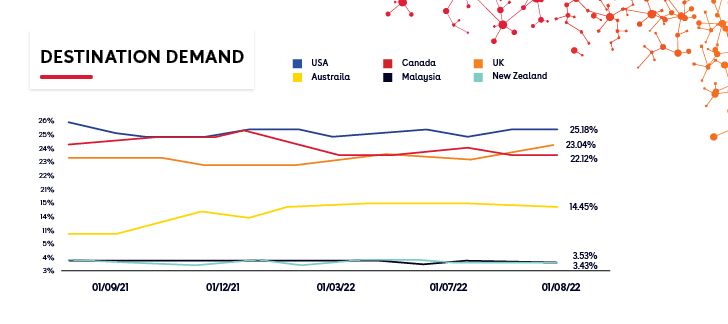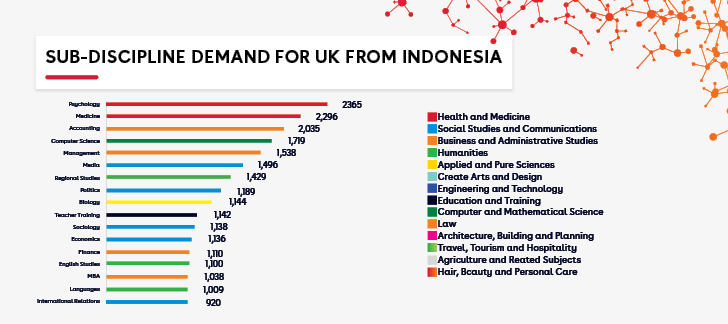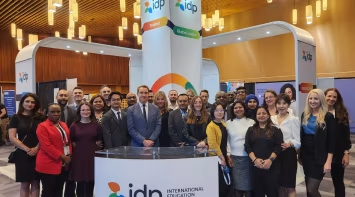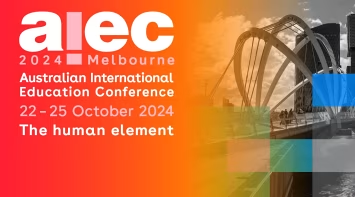The start of a new academic year is a good time to take stock of trends from the previous 12 months to help predict what the next recruitment cycle may look like and plan accordingly. The UK has done particularly well in terms of recruiting international students throughout the pandemic years and has already reached its target of welcoming over 600,000 international students, 10 years before the government target of reaching this number by 2030. However, now that COVID-19 restrictions have been lifted in countries like Australia and New Zealand, the playing field is likely to become increasingly level.
UK institutions need to work harder to maintain their popularity among prospective international students in the long term. A good starting point is to understand the needs and preferences of international students from different source markets.
Post-study work opportunities are for instance more important to Indian and Nigerian students compared to Chinese students, which means that institutions should differentiate their marketing approaches regionally.
Understanding demand trends for subjects and labour market gaps across source markets is another way to tailor marketing campaigns that speak to the needs of prospective students in different countries.
US, Canada and UK are the highest-demand study destinations - Australia on the rise
Our IQ Demand tool, which tracks the research behaviour of 100m+ prospective international students using our suite of student sites each year, shows that competition has been tight over the last 12 months between the top three shareholding study destinations – the US, Canada and the UK.

Canada and the US were on a par towards the end of last year before the US took the lead. From about March this year, the UK has been making headway, overtaking Canada in July and now claiming the second highest percentage share of all destinations.
Since September 2021 till the end of August 2022, Australia’s percentage share has gradually increased from 11.33% to 14.45%, perhaps an indication that more prospective students are likely to consider Australia again as a study destination now that COVID-19 restrictions have been lifted.
What will be interesting is to see how demand for both Australia and New Zealand changes in the coming months, given that both countries have lifted restrictions.
High growth in demand for UK from Turkey and Nigeria
Considering the global picture, India has had the highest percentage share (12.57% at the end of the 12-month period) of all source markets, followed by Indonesia and Brazil. Thailand has seen a drop from 8.46% at the beginning of the 12-month period to 4.82% towards the end.
Looking at demand for the UK only, overall, India and Indonesia have been the top two source markets over the last 12 months in terms of share, followed by Thailand and Turkey. Big strides have been made by Turkey, climbing into second position above Indonesia towards the very end of the 12-month period. Even though Nigeria only placed in 6th position for market share, it saw substantial growth in the last 12 months, climbing from 2.42% to 5.61%.
For the next recruitment cycle, UK institutions need to nurture the high demand from markets like Indonesia. Demand from Indonesia has been steady for the UK, but with Australia reopening its borders, more Indonesian students are likely to choose neighbouring Australia as a study destination going forward. UK institutions should thus maintain their position by actively marketing scholarship opportunities, promoting the Graduate Route Visa, and showcasing the cultural riches of the UK.

Source-market cities: Bangkok highest demand for UK
Interestingly, the source-market city with the highest percentage share for the UK over the last 12 months was Bangkok with 3.97% of share, followed by Lagos with 3.36% and Istanbul with 2.9%. For Bangkok, Lagos and Istanbul, Health and Medicine was the subject area that drove the highest percentage of demand. Of these three cities, Lagos placed highest in share for Health and Medicine at 31.97%. Jakarta, which had the fourth highest demand for the UK, had Business and Administrative Studies as its most-in-demand subject area with Health and Medicine in third position.

Psychology most popular sub-disciplines among Indonesian and Turkish researchers
As the source market with the biggest percentage share for the UK, India placed Medicine, Computer Science and Biology as the top three in-demand sub-disciplines. For the Indonesian market, the UK’s second largest source market in share, Psychology has been the most in demand sub-discipline over the last 12 months, followed by Medicine and Accounting. Psychology was also the most in-demand sub-discipline in market share among Turkish researchers interested in studying in the UK.

What do these trends mean for the future?
The UK is globally in a strong position having recently overtaken Canada as the second most popular study destination in terms of demand. However, with Australia seeing a rise in demand, the UK will need to work hard to maintain its position.
Vigorous promotion of the UK’s high quality of education, its Graduate Route Visa, alumni success stories, and cultural riches should continually form part of ongoing marketing campaigns.
While India remains the UK’s most important source market, high growth markets like Turkey and Nigeria present excellent opportunities for recruitment. As the top source-market city for the UK, Bangkok should also be prioritised as a key recruitment market.
Different source markets rank subjectareas and sub-disciplines differently. Going forward, emphasis should be placed on Health and Medicine for the Lagos market, as it’s been themost in-demand subject area over the last 12 months, while for the Jakarta market the focus should be on in-demand Business and Administrative Studies.
Get in touch with us today for a detailed analysis on how your institution can successfully tailor recruitment and marketing drives in key source markets to boost international recruitment.
On 11 October, we are hosting an IQ webinar Data intelligence and foresight: Using IQ real-time data to overcome key challenges in international student recruitment. Please register your place today to discover more on how our IQ data supports UK institutions: https://zoom.us/webinar/register/WN_h0hu9C2IQlCOhStdBAPXIQ
Let us join you on your journey
Connect with us to learn how we can help you reach your student enrolment goals
Get in touchYou might like...

Indonesia: The Rising Source Market of Southeast Asia
Our latest regional source market report focusing on Indonesia as a growing diversity market

Changing Parental Perceptions and Motivations in the International Education Decision Making Process
Parents are now more concerned about graduate employment opportunities than distance from friends and family.

2023: A year of global teamwork, influence, and putting the student voice first
Simon Emmett, CEO of IDP Connect, reflects on a collaborative 2023 and looks forward to 2024.

